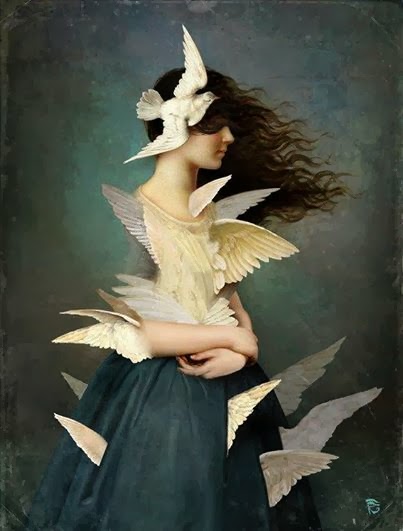When I ask myself why, there is no one bright and shiny answer to this, but many small slightly shimmering ones which do, I believe, flow from the same mysterious something, like a well of things coming together and creating a whole which is bigger than its consistent parts. And this something seeps through the whole of this story. The way it is told, what is being told, the characters of the story who are carrying the tale forward. All refined and believably real -- and then real in a good way. All are interesting characters with personified traits. I have really started to like the ordinariness of Cecilia, for example. There is great power in ordinariness as long as one fills it and leaves it be, without trying to become something much more than what one actually is. In Cecilia's case, it turns out she is strong-willed with a pure mind, something which in combination with her ordinariness makes a solid character. And Robbie is of course a guy with which I would very much like to be acquainted -- filled with a kind of vitality and initiative and a self-made sharpness which is something to reach for in one's own life.
And then there is Briony, the eye and mind of the whole story, the narrator and the closer and the genesis of the narrative in this form.
The whole novel is in a way about writing, of genre, style and the nature of narrating. It is about how good stories have an intelligence of their own, and how when mixed with real lives, horrible things might happen. The language captures all of this completely. McEwan's endless sensibility in the land of words, rhythms, sounds and associations leads you through this painful and beautiful, dreamlike and starkly realistic story. Some of the beauty is the mixture of the flowing of the words and the characters' thoughts on the one hand, and on the other the brutality of the events spiralling out from the central point of the plot: Briony's lie, spun around a scene of two lovers which this thirteen year old girl cannot understand. It is her imagined version of reality which is setting the frame for this story and which makes the tragedy happen.
There is a whole line of the discussion of this novel which can be spun around the role of the author in modern society, the place and/or danger of a vivid imagination etc. and these are interesting thoughts. I just don't have room for them in this posting.
And then, of course, there is the beautiful tragic love story at the centre of the plot. I find it impossible to keep my eyes dry when watching the movie (by Joe Wright). Two lovers undeservedly ripped apart and the lifelong atonement of the storyteller gets me every time. I try to cling to the fact that it is all fictional, but that doesn't do any good of course (and what is the difference between reality and fiction when it comes to how and what really moves us?). Again I realize that there is nothing like a strong love story to have me coming back to a story over and over. I mean, why else would I read Pride and Prejudice so many times? And although Atonement doesn't actually end happily, I am still drawn towards this book. The beauty of the language, the aliveness of the characters, the poetry of frame, actions and history seeping through every word. To me the story even has a scent, a watery, pure, fresh and sweet scent. (Did Wagner ever include smells in his idea of the Gesamtkunstwerk?)
In a way I believe that it is the story which attracts the author, the story which comes to the author and starts unwinding itself in the author's sensory field. Of course it takes a fine mind to give the story flesh and colour, sound and breath the way McEwan does it but it is still my belief that many of the best stories have presented themselves in some way (and artists seem to be people who are more sensitive to this) and that it is down to the writer to try to uncover and convey it the best way possible.
Here is an excerpt of McEwan's next novel Solar, taken from The New Yorker, a weekly magazine. No need to say that I am looking forward to this one.
And then, of course, there is the beautiful tragic love story at the centre of the plot. I find it impossible to keep my eyes dry when watching the movie (by Joe Wright). Two lovers undeservedly ripped apart and the lifelong atonement of the storyteller gets me every time. I try to cling to the fact that it is all fictional, but that doesn't do any good of course (and what is the difference between reality and fiction when it comes to how and what really moves us?). Again I realize that there is nothing like a strong love story to have me coming back to a story over and over. I mean, why else would I read Pride and Prejudice so many times? And although Atonement doesn't actually end happily, I am still drawn towards this book. The beauty of the language, the aliveness of the characters, the poetry of frame, actions and history seeping through every word. To me the story even has a scent, a watery, pure, fresh and sweet scent. (Did Wagner ever include smells in his idea of the Gesamtkunstwerk?)
In a way I believe that it is the story which attracts the author, the story which comes to the author and starts unwinding itself in the author's sensory field. Of course it takes a fine mind to give the story flesh and colour, sound and breath the way McEwan does it but it is still my belief that many of the best stories have presented themselves in some way (and artists seem to be people who are more sensitive to this) and that it is down to the writer to try to uncover and convey it the best way possible.
Here is an excerpt of McEwan's next novel Solar, taken from The New Yorker, a weekly magazine. No need to say that I am looking forward to this one.









